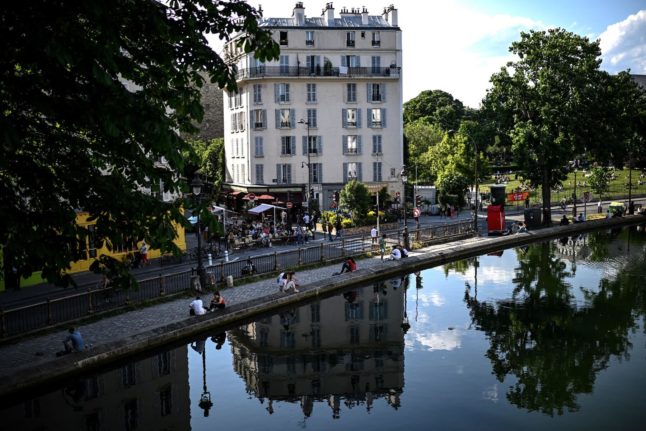Spring means blossoms, daffodils, fluffy ducklings in the river and lambs in the fields – but if you’re in France there are also some other signs that the season has changed.
1 Pétanque
Technically you can play pétanque at any time, but the professional sport (yes, that’s a thing) has a season and it normally begins in late February/early March.
More informal street pétanque usually sees an uptick as the nights get lighter and the weather more pleasant. So if you’re passing through a French village and hear screams, howls and verbal abuse – don’t panic, it’s probably just a few residents getting emotionally involved in a game of pétanque.
10 things you probably didn’t know about pétanque
2 Rosé
While red and white wines are drunk all year round, rosé wines are more strongly associated with summer.
As one French wine blog puts it, rosé is associated with “vacances, aux barbecues entre amis, aux nonchalantes séances apéritives en bord de piscine” (summer holidays, BBQs with friends and relaxed pre-dinner drinks around the pool).
While bars and cafés offer rosé all year round, and there’s nothing wrong with drinking it in winter if you fancy a glass, in the spring you will suddenly see the shelves in the supermarkets and wine caves fill up with rosés.
By the power of suggestion, suddenly everyone will start ordering a glass of rosé when they meet for apéro on the café terrace.
3 Terraces
Which brings us to terraces – many French cafés keep at least some outdoor seating all year round (for the smokers) but as the weather warms up les terrasses are expanded and the temporary walls or shelters are removed to make them truly outdoor spaces, ideal for soaking up some sun while you enjoy a drink and keep an eye on passers-by.
In Paris there is an official summer terrace (terrasses estivals) season and it begins on April 1st. After this date bar or café owners who have a licence from city hall are permitted to expand their terrace spaces into areas of the street or former parking spaces – an extension of the informal café terrace expansions during the pandemic.
On a spring evening there are few better places to be in the world than sipping a drink (probably a glass of rosé of perhaps an early Apérol spritz) on a café terrace in the sun and idly chatting or contemplating the meaning of life.
4 Spring vegetables
Markets run all year round in France, but they’re undeniably better once the spring arrives. Gone are the muddy piles of turnips and celeriac and instead there is a profusion of fresh asparagus – during its short season asparagus will be piled high on market stalls and appearing on every restaurant menu.
It will be followed by spring greens, artichokes, radishes and lettuce and then in early summer the first seasonal fruits arrive – strawberries, apricots and peaches.
5 Big coats
You might think that it’s getting warmer, but don’t expect your French friends to shed their big coats and scarves until the early summer.
Dressing tends to be more seasonal in France and locals will keep pulling on coats (or at least jackets, accessorised with a natty scarf naturally) while you’re wandering around in a T-shirt.
The concession to sunny days is that sunglasses will come out.
6 Lunchtime picnics
Naturally summer is the main picnic season and the French really do love a good picnic (by which we mean several courses of good food and wine, concluding with fresh summer fruit, a tart from the patisserie or both).
However, from spring you’ll start to see French office workers take advantage of the warmer weather to take their lunch to eat in the park or on the river/ canal bank.
If you’re in a city and are close to a river or canal at lunchtime on a fine spring day, expect to see the banks full at lunchtime as people have lunch, chat with their colleagues or just read a book in the sunshine (taking advantage of those French lunch breaks).
As the nights get lighter, river and canal banks also become a popular evening hangout for young people, having an impromptu picnic with a bottle of wine or some beers as a cheap night out.
7 Festivals
Be prepared for local fairs, fêtes, festivals and carnivals to kick up a notch once spring arrives.
From local food festivals to international film festivals, via the traditional Easter events, the festival calendar fills up pretty quickly once spring arrives
Places to visit and things to do in France in spring 2024
8 Chocolate fish, rabbits and eggs
We mentioned Easter and naturally the shops fill up with chocolate once that happens.
Around the same time, depending on when Easter falls that year, you will also see chocolate fish in the shops.
This has to do with the poisson d’avril tradition – the day of practical jokes on April 1st (similar to April Fools’ Day).
On the day, be prepared to be pranked or to have children try and attach a paper fish to your back, marking you out as the poisson, or the one who was made a fool of.
9 Public holidays and riots
May is a prime month for public holidays in France – there are always at least two (May Day on May 1st and VE Day on May 8th) plus the likelihood of two more Christian holidays – Ascension and Pentecost – which don’t have fixed dates.
This year all four are indeed in May, with a rare ‘double holiday’ because VE Day is on Wednesday May 8th and Ascension is on Thursday May 9th. Expect plenty of French people to do ‘doing the bridge’ over some or all of these holidays and probably don’t try to get any admin tasks done.
Why 2024 is a good holiday year in France
May 1st, the international workers day, is marked by huge demos which sometimes flare into mini riots, depending on the public mood.
10 Tax stress
And just in case this was all sounding too jolly – spring is also tax declaration season in France.
Expect to see lots of media articles about the dreaded déclaration des revenues, plus queues out of the door of the tax office and people generally looking stressed about completing the annual declaration, which must be done by almost everyone who lives in France, even those who have no income here.
This year declarations open on April 13th and you can find lots of help and information in our tax declaration section HERE.



 Please whitelist us to continue reading.
Please whitelist us to continue reading.
Member comments